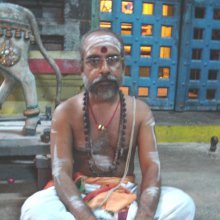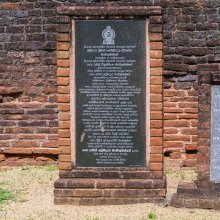Mahotsava, Maha-utsava: 22 definitions
Introduction:
Mahotsava means something in Hinduism, Sanskrit, the history of ancient India, Marathi, Hindi. If you want to know the exact meaning, history, etymology or English translation of this term then check out the descriptions on this page. Add your comment or reference to a book if you want to contribute to this summary article.
Alternative spellings of this word include Mahotsav.
Images (photo gallery)
In Hinduism
Shaivism (Shaiva philosophy)
Source: Shodhganga: Temple management in the ĀgamasMahotsava (महोत्सव) refers to periodical pūjā or Parārthapūjā as defined in the Śaivāgamas.—Brahmotsava or Mahotsava that is a large-scale festival celebrated every year at all Śiva temples, involving flag hoisting and daily ritual procession of the Lord in the morning and evening in various forms and vāhanas, ending with lowering the flag. Mahotsava is hailed as a democratic, social festival with the participation and contribution of people from all walks of life including decoraters, traders, craftsmen, tailors, flower-sellers, singers, musicians, artists, carpenters, public speakers, other performers and so on.
The mahotsava is considered the culmination of the entire year’s worship at the temple. The Lord and his retinue come out of the temple to bless the entire village. Each year, the nakṣatra, month, tithi and other parameters must be analyzed well before time and the utsava schedule fixed according to the day of the tīrtha. The mahotsava must be conducted for 27 days, 18 days, 9 days or at least one day. If mahotsava is not performed, it causes great harm to the king and kingdom.
Source: eScholarship: The descent of scripture: a history of the KamikagamaMahotsava (महोत्सव) refers to “great festivals”, according to the Kāmikāgama: an ancient Śaiva Āgama scripture in 12,000 Sanskrit verses dating to at least the 5th century and represented as an encyclopedic account of ritual instructions (kriyāpāda).—In modern print editions, the Kāmika-āgama is structured in two major parts. The Uttarabhāga consists of 98 chapters (paṭalas) [...] Chapters 5 to 18 present a thematic focus on festivals and other occasional rites. [...] In Chapter 6, we find general procedures for great festivals (mahotsava). Chapter 7 explains the rite of ceremonial lamp-waving. This is followed in Chapter 8 by a description of Dīpāvalī practices in the month of Kārttika.
Source: Cracow Indological Studies: Paḷḷivēṭṭa, or the ‘Royal Hunt’, in Prescriptive Literature and in Present-day Practice in KeralaMahotsava (महोत्सव) refers to “annual great festivals” according to the Āgama literature.—Festivals (utsava) are an important feature of Indian temple culture. It is said the virtue of a temple depends on five different aspects: the religious austerity of the Ācārya (tapas), recitation of the Vedas (japa), following the rules as instructed in the scriptures (niyama), festivals (utsava), and the giving of food (annadāna). [...] In the ritual manuals that are produced in different regions of India, we find descriptions of various types of festival [including annual great festivals (mahotsava)].

Shaiva (शैव, śaiva) or Shaivism (śaivism) represents a tradition of Hinduism worshiping Shiva as the supreme being. Closely related to Shaktism, Shaiva literature includes a range of scriptures, including Tantras, while the root of this tradition may be traced back to the ancient Vedas.
Purana and Itihasa (epic history)
Source: archive.org: Shiva Purana - English TranslationMahotsava (महोत्सव) refers to “great festivities”, according to the Śivapurāṇa 2.2.19. Accordingly as Brahmā narrated to Nārada:—“[...] then at my bidding in the capacity of the main priest, Śivā and Śiva duly and with great delight performed the circumambulation of the sacred fire. O excellent Brahmin, then wonderfully great festivities (mahotsava) were conducted with beatings of drums and playings on musical instruments accompanied by songs and dances pleasing everyone”.

The Purana (पुराण, purāṇas) refers to Sanskrit literature preserving ancient India’s vast cultural history, including historical legends, religious ceremonies, various arts and sciences. The eighteen mahapuranas total over 400,000 shlokas (metrical couplets) and date to at least several centuries BCE.
Vaishnavism (Vaishava dharma)
Source: Pure Bhakti: Brhad BhagavatamrtamMahotsava (महोत्सव) refers to:—Joyous spiritual festival. (cf. Glossary page from Śrī Bṛhad-bhāgavatāmṛta).

Vaishnava (वैष्णव, vaiṣṇava) or vaishnavism (vaiṣṇavism) represents a tradition of Hinduism worshipping Vishnu as the supreme Lord. Similar to the Shaktism and Shaivism traditions, Vaishnavism also developed as an individual movement, famous for its exposition of the dashavatara (‘ten avatars of Vishnu’).
Shaktism (Shakta philosophy)
Source: Google Books: Manthanabhairavatantram1) Mahotsava (महोत्सव) refers to one of the eight Heroes (vīra-aṣṭaka) associated with Pūrṇagiri or Pūrṇapīṭha (which is located in the northern quarter), according to the Manthānabhairavatantra, a vast sprawling work that belongs to a corpus of Tantric texts concerned with the worship of the goddess Kubjikā.—[...] The eight heroes (vīrāṣṭaka): Chadmaka, Pramāthin, Prakṛṣṭa, Pramodin, Śaṅkukarṇa, Gokarṇa, Saṃvatsara, Mahotsava.
2) Mahotsava (महोत्सव) or Laghvībīja refers to the Vidyā associated with Pūrṇagiri, one of the eight Sacred Seats (pīṭha), according to the Yogakhaṇḍa (chapter 14) of the Manthānabhairavatantra.

Shakta (शाक्त, śākta) or Shaktism (śāktism) represents a tradition of Hinduism where the Goddess (Devi) is revered and worshipped. Shakta literature includes a range of scriptures, including various Agamas and Tantras, although its roots may be traced back to the Vedas.
Yoga (school of philosophy)
Source: ORA: Amanaska (king of all yogas): A Critical Edition and Annotated Translation by Jason BirchMahotsava (महोत्सव) refers to the “great festival (of Śiva)”.—The Yogajāgama is the name of a text dealing with Śaiva rituals ranging from daily purification (śaucavidhi) to the great festival of Śiva (śivotsava-vidhi or mahotsava-vidhi) with no chapters on Yoga.

Yoga is originally considered a branch of Hindu philosophy (astika), but both ancient and modern Yoga combine the physical, mental and spiritual. Yoga teaches various physical techniques also known as āsanas (postures), used for various purposes (eg., meditation, contemplation, relaxation).
Pancaratra (worship of Nārāyaṇa)
Source: archive.org: Catalogue of Pancaratra Agama TextsMahotsava (महोत्सव) refers to the “major festivals”, as discussed in the twenty-first chapter of the Aniruddhasaṃhitā, an ancient Pāñcarātra Āgama text dealing with the annual festivals of temples and regular temple worship routines.—[Cf. the chapter mahotsava-vidhi]:—A calendar of 17 events for the full ten days of the great annual festival—Brahmotsava—is given, for which the flag-hoisting ceremony is invariably to be done (1-5). Various ceremonies connected with germinating sprouts [aṅkurārpaṇa] must first have been attended to some days in advance (6-42). Then, on the first day of the mahotsava, there will be a procession of the balibera-idol (43-50), while the utsavabera-idol is to be paraded twice daily on different vehicles for nine days to different optional places (51-58). [...] Sometime after this, homa, will be performed, the attendant gods will be dismissed, the flag lowered, and awards distributed to the participants (100-108). The benefits for underwriting such a mahotsava are listed ( 109-112 ).

Pancaratra (पाञ्चरात्र, pāñcarātra) represents a tradition of Hinduism where Narayana is revered and worshipped. Closeley related to Vaishnavism, the Pancaratra literature includes various Agamas and tantras incorporating many Vaishnava philosophies.
India history and geography
Source: Singhi Jain Series: Ratnaprabha-suri’s Kuvalayamala-katha (history)Mahotsava (महोत्सव) refers to the “great festival” (of coronation of a crown prince), which was celebrated in ancient India, as depicted in the Kathās (narrative poems) such as Uddyotanasūri in his 8th-century Kuvalayamālā (a Prakrit Campū, similar to Kāvya poetry).—Page 199: Here is described yuvarāja-abhiṣeka-mahotsava when the city of Ayodhyā put on gala appearance by means of beautifying streets, sprinkling of scented waters on its roads, hanging of flower-garlands, putting up golden gates, adorning the palace, decorating the floor in front of the entrances, making paintings on the walls of the public audience, making offerings on the cross roads, beginning dramatic performances, hoisting of the lion banners, installing canopies, cloth pieces were being torn in proper pieces pālī for being wrapped round the post, pendants like the Kaṭisūtra ornaments were hung from the ceilings of doorways and walls of the houses, the great jewels were being taken out and put on show in the treasury, the pearls-strings were hung as festoons, so also were hung the flower-pendants. In the āsthānamaṇḍapa was placed a big royal throne which was occupied by prince regent Kuvalayacandra and decked with golden pitchers studded with many kinds of jewels and covered with golden lotuses.

The history of India traces the identification of countries, villages, towns and other regions of India, as well as mythology, zoology, royal dynasties, rulers, tribes, local festivities and traditions and regional languages. Ancient India enjoyed religious freedom and encourages the path of Dharma, a concept common to Buddhism, Hinduism, and Jainism.
Languages of India and abroad
Marathi-English dictionary
Source: DDSA: The Molesworth Marathi and English Dictionarymahōtsava (महोत्सव).—m (S) mahōtsāha m (S) Any great festival or great rejoicings.
Source: DDSA: The Aryabhusan school dictionary, Marathi-Englishmahōtsava (महोत्सव).—m Any great festival or great rejoicings.
Marathi is an Indo-European language having over 70 million native speakers people in (predominantly) Maharashtra India. Marathi, like many other Indo-Aryan languages, evolved from early forms of Prakrit, which itself is a subset of Sanskrit, one of the most ancient languages of the world.
Sanskrit dictionary
Source: DDSA: The practical Sanskrit-English dictionaryMahotsava (महोत्सव).—
1) a great festival or occasion of joy; नयनविषयं जन्मन्येकः स एव महोत्सवः (nayanaviṣayaṃ janmanyekaḥ sa eva mahotsavaḥ) Mālatīmādhava (Bombay) 1.36.
2) the god of love.
Derivable forms: mahotsavaḥ (महोत्सवः).
Mahotsava is a Sanskrit compound consisting of the terms mahā and utsava (उत्सव).
Source: Cologne Digital Sanskrit Dictionaries: Shabda-Sagara Sanskrit-English DictionaryMahotsava (महोत्सव).—m.
(-vaḥ) 1. A great festival. 2. Kama. E. mahā, and utsava a festival.
Source: Cologne Digital Sanskrit Dictionaries: Cappeller Sanskrit-English DictionaryMahotsava (महोत्सव).—[masculine] great festival.
Source: Cologne Digital Sanskrit Dictionaries: Monier-Williams Sanskrit-English Dictionary1) Mahotsava (महोत्सव):—[from mahā > mah] m. (ifc. f(ā). ) a gr° festival, any gr° rejoicing, [Mahābhārata; Kāvya literature] etc.
2) [v.s. ...] the god of love, [cf. Lexicographers, esp. such as amarasiṃha, halāyudha, hemacandra, etc.]
Source: Cologne Digital Sanskrit Dictionaries: Yates Sanskrit-English DictionaryMahotsava (महोत्सव):—[maho+tsava] (vaḥ) 1. m. Great festival.
Source: DDSA: Paia-sadda-mahannavo; a comprehensive Prakrit Hindi dictionary (S)Mahotsava (महोत्सव) in the Sanskrit language is related to the Prakrit word: Mahūsava.
[Sanskrit to German]
Sanskrit, also spelled संस्कृतम् (saṃskṛtam), is an ancient language of India commonly seen as the grandmother of the Indo-European language family (even English!). Closely allied with Prakrit and Pali, Sanskrit is more exhaustive in both grammar and terms and has the most extensive collection of literature in the world, greatly surpassing its sister-languages Greek and Latin.
Hindi dictionary
Source: DDSA: A practical Hindi-English dictionaryMahotsava (महोत्सव) [Also spelled mahotsav]:—(nm) a great celebration, festival.
...
Kannada-English dictionary
Source: Alar: Kannada-English corpusMahōtsava (ಮಹೋತ್ಸವ):—
1) [noun] a great festival.
2) [noun] any great rejoicing; great joy.
Kannada is a Dravidian language (as opposed to the Indo-European language family) mainly spoken in the southwestern region of India.
See also (Relevant definitions)
Partial matches: Maha, Utsava.
Starts with: Mahotsavamaya, Mahotsavavidhi.
Ends with (+11): Abhishekamahotsava, Amritamahotsava, Ashtahnikamahotsava, Atthai-mahotsava, Dikshamahotsava, Indramahotsava, Kaumudimahotsava, Madanamahotsava, Madhumasamahotsava, Mahendramahotsava, Maheshamahotsava, Mallakridamahotsava, Navacandimahotsava, Navasamvatsara Mahotsava, Navavarshamahotsava, Parapushtamahotsava, Parinirvanamahotsava, Parinishkramtimahotsava, Rajatamahotsava, Rajnamindramahotsava.
Full-text (+87): Mahotsavavidhi, Mahotsav, Parapushtamahotsava, Madanamahotsava, Rathamahotsava, Makorcavam, Mocchava, Mahotsavamaya, Motsava, Kaumudimaha, Rasamahotsava, Dikshamahotsava, Navavarshamahotsava, Mahusava, Mahotsavin, Indramahotsava, Kaumudimahotsava, Yatramahotsava, Madhumasamahotsava, Snana-mahotsava.
Relevant text
Search found 16 books and stories containing Mahotsava, Maha-utsava, Mahā-utsava, Mahōtsava; (plurals include: Mahotsavas, utsavas, Mahōtsavas). You can also click to the full overview containing English textual excerpts. Below are direct links for the most relevant articles:
Garga Samhita (English) (by Danavir Goswami)
Verse 3.2.27 < [Chapter 2 - The Great Festival of Śrī Girirāja]
Verse 5.7.4 < [Chapter 7 - The Killing of Kuvalayāpīḍa]
Chapter 2 - The Great Festival of Śrī Girirāja < [Canto 3 - Girirāja-khaṇḍa]
Bhakti-rasamrta-sindhu (by Śrīla Rūpa Gosvāmī)
Verse 1.2.220 < [Part 2 - Devotional Service in Practice (sādhana-bhakti)]
Verse 3.4.51 < [Part 4 - Parenthood (vātsalya-rasa)]
Verse 2.1.324 < [Part 1 - Ecstatic Excitants (vibhāva)]
Malatimadhava (study) (by Jintu Moni Dutta)
Part 5.3b - Artha-doṣa (defect of sense) < [Chapter 2 - Literary Study of the Mālatīmādhava]
Part 2.3b - Arthālaṃkāras (Figure of Sense) < [Chapter 2 - Literary Study of the Mālatīmādhava]
Sanskrit sources of Kerala history (by Suma Parappattoli)
12. Astami-Mahotsava by Melpathur Narayana Bhattathiri < [Chapter 5 - Sanskrit Dramas and Campus bearing on Kerala History]
Brihad Bhagavatamrita (commentary) (by Śrī Śrīmad Bhaktivedānta Nārāyana Gosvāmī Mahārāja)
Verse 2.1.148 < [Chapter 1 - Vairāgya (renunciation)]
Verse 1.1.30-31 < [Chapter 1 - Bhauma (the earthly plane)]
Verse 1.4.80 < [Chapter 4 - Bhakta (the devotee)]
Harshacharita (socio-cultural Study) (by Mrs. Nandita Sarmah)
12. Festivals (Mahotsava) < [Chapter 6 - Other Socio-Cultural Aspects]
2. Dissimilarities (4): Festivals < [Chapter 8 - Comparative Society as described in the Kādambarī and the Harṣacarita]


